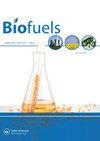A bibliometric analysis of studies on diesel engines fuelled with biodiesel and its blends: trends, hotspots, and future research
IF 2.6
4区 工程技术
Q3 ENERGY & FUELS
引用次数: 2
Abstract
AbstractA bibliometric analysis of publications on biodiesel (and biodisel blend)-fuelled engine performance research (BBFEPR) was performed. Data of published works (1993–2021) were extracted using the Scopus® database. The network analyses of the obtained data were conducted using VOS Viewer® software to study the citation of journals and scientific papers, co-authorship by organization and country, and co-occurrence of author keywords involved in BBFEPR. A total of 2454 scientific articles (1797 journal articles, 508 conference papers, 130 review papers, and 19 conference review papers) were published concerning the BBFEPR. An increasing trend in publication was observed for the period under consideration. The network analysis revealed that India was the most productive country (with 1419 publications) while the most productive institution was the University of Malaya. The work published by Agarwal in 2007 (2393 citations) and the journal Fuel (11,610 citations) have the highest number of citations. Authors used ‘biodiesel’ followed by ‘combustion’, with 953 and 548 occurrences, respectively, as keywords. Research hotspots focused on biodiesel additives and feedstock development, combustion and performance improvement, and emission reduction strategies. Future research trends centered on the deployment of a magnetic field and nanoparticles to enhance combustion, performance, and emission characteristics; and on the use of nano-catalysts to improve biodiesel production.Keywords: Bibliometric analysisbiodieselcombustiondieselemissionengine performance AcknowledgementsThe assistance of Mrs. O.L. Giwa during the preparation of this manuscript is highly valued.Disclosure statementThe authors declare no conflict of interest.以生物柴油及其混合物为燃料的柴油发动机研究的文献计量学分析:趋势、热点和未来研究
摘要对生物柴油(和生物柴油混合物)燃料发动机性能研究(BBFEPR)的出版物进行了文献计量分析。使用Scopus®数据库提取1993-2021年的已发表作品数据。利用VOS Viewer®软件对获得的数据进行网络分析,研究BBFEPR涉及的期刊和科技论文的被引情况、组织和国家的合著情况以及作者关键词的共现情况。BBFEPR共发表科学论文2454篇,其中期刊论文1797篇,会议论文508篇,综述论文130篇,会议综述论文19篇。在本报告所述期间,出版物有增加的趋势。网络分析显示,印度是生产力最高的国家(有1419份出版物),而生产力最高的机构是马来亚大学。被引用次数最多的是阿加瓦尔2007年发表的论文(2393次)和《燃料》杂志(11610次)。作者使用的关键词是“生物柴油”,其次是“燃烧”,分别出现了953次和548次。研究热点集中在生物柴油添加剂和原料开发、燃烧和性能改进、减排策略等方面。未来的研究趋势集中在磁场和纳米颗粒的部署,以提高燃烧,性能和发射特性;以及利用纳米催化剂改善生物柴油的生产。关键词:文献计量学分析生物柴油燃烧柴油排放发动机性能致谢在准备这篇手稿期间,O.L. Giwa夫人的帮助是非常宝贵的。声明作者声明无利益冲突。
本文章由计算机程序翻译,如有差异,请以英文原文为准。
求助全文
约1分钟内获得全文
求助全文
来源期刊

Biofuels-Uk
Energy-Renewable Energy, Sustainability and the Environment
CiteScore
5.40
自引率
9.50%
发文量
56
期刊介绍:
Current energy systems need a vast transformation to meet the key demands of the 21st century: reduced environmental impact, economic viability and efficiency. An essential part of this energy revolution is bioenergy.
The movement towards widespread implementation of first generation biofuels is still in its infancy, requiring continued evaluation and improvement to be fully realised. Problems with current bioenergy strategies, for example competition over land use for food crops, do not yet have satisfactory solutions. The second generation of biofuels, based around cellulosic ethanol, are now in development and are opening up new possibilities for future energy generation. Recent advances in genetics have pioneered research into designer fuels and sources such as algae have been revealed as untapped bioenergy resources.
As global energy requirements change and grow, it is crucial that all aspects of the bioenergy production process are streamlined and improved, from the design of more efficient biorefineries to research into biohydrogen as an energy carrier. Current energy infrastructures need to be adapted and changed to fulfil the promises of biomass for power generation.
Biofuels provides a forum for all stakeholders in the bioenergy sector, featuring review articles, original research, commentaries, news, research and development spotlights, interviews with key opinion leaders and much more, with a view to establishing an international community of bioenergy communication.
As biofuel research continues at an unprecedented rate, the development of new feedstocks and improvements in bioenergy production processes provide the key to the transformation of biomass into a global energy resource. With the twin threats of climate change and depleted fossil fuel reserves looming, it is vitally important that research communities are mobilized to fully realize the potential of bioenergy.
 求助内容:
求助内容: 应助结果提醒方式:
应助结果提醒方式:


